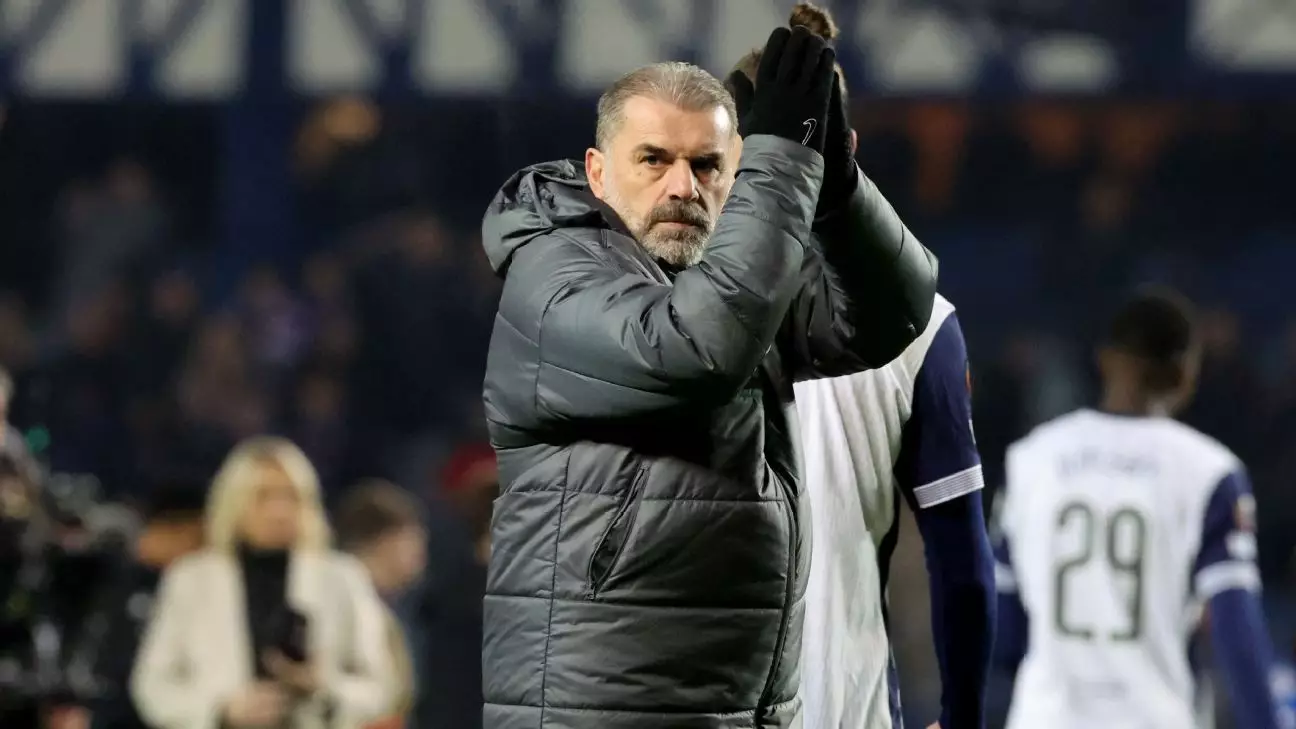Ange Postecoglou finds himself in a challenging position as the head coach of Tottenham Hotspur. The pressure is mounting with a series of disappointing performances on the pitch, leading to scrutiny from fans and pundits alike. The Australian manager emphasized his commitment to turning the tide, asserting confidently, “I love being in the middle of a storm.” His remarks are emblematic of a leader determined to confront adversity head-on, but the question remains: can he navigate this turbulent period and restore faith in his vision for the club?
In the world of football, expectations can become a double-edged sword, and for Tottenham Hotspur, this is particularly poignant. Coming off a 1-1 draw against Rangers and a string of poor results, the club’s trajectory has deviated from the ambitions that marked the start of the season. With only one victory in the last eight matches, Tottenham now finds itself flirting with a crisis. This ideological clash between the present underperformance and the club’s storied history is a source of frustration for supporters who seek immediate success.
The intensity of the pressure is palpable, especially after a heated confrontation between fans and Postecoglou post-defeat against Bournemouth. When a manager’s future is called into question, it casts a shadow over their strategies and philosophies, compelling them to rapidly adjust their methods. Postecoglou’s challenge lies not only in changing results on the field but also in mending the frayed relationship with a fanbase that is quickly losing patience.
When asked about the possibility of following in former manager Antonio Conte’s footsteps by publicly criticizing his squad, Postecoglou opted for a more reflective approach. He chose to regard performance feedback as a tool for growth rather than a weapon of critique. His assertion that he is “in it for the fight” hints at a philosophy rooted in resilience and self-accountability. Unlike Conte, who famously lambasted his players for their lack of character during a key match against Southampton in 2023, Postecoglou appears to advocate for a more constructive dialogue within the team framework.
His insistence on avoiding excuses reflects an understanding that the culture of a club must evolve beyond previous failings. In his view, attributing lack of success to a mythical cloud hanging over Tottenham undermines the team’s potential and places undue blame on the institution rather than the individuals responsible. This perspective not only demonstrates his determination but also highlights a call to arms for his players to assume responsibility for their role within the squad’s current predicament.
As Tottenham prepares to face bottom-placed Southampton, the fitness of key players remains a significant concern. Central defenders Cristian Romero and Micky van de Ven’s injuries pose a challenge that is emblematic of a deeper issue—squad depth and capability. Postecoglou’s ability to mobilize alternate strategies and players will be crucial in maintaining a competitive edge. His hope for defender Ben Davies to return provides a flicker of optimism, yet it underscores the precarious balance the club must strike in maintaining performance levels.
The depth of the squad is a critical factor in how effectively the team can weather challenges. With injuries depleting available talent, Postecoglou’s leadership will be instrumental in fostering a sense of collective responsibility among the remaining players. His approach must ensure that those stepping onto the field are not merely filling gaps but are instead galvanized by the opportunity to contribute to a larger cause—a vintage Tottenham performance.
As Tottenham gears up for a crucial clash at St. Mary’s Stadium, Postecoglou stands at a crossroads, with his leadership style put to the ultimate test. The emotional day-to-day experiences of the coach are intertwined with the futures of the players and the aspirations of the club. The challenge extends beyond simply securing points; it involves re-establishing a competitive identity that has often eluded the club’s grasp in recent years.
In times of scrutiny, leaders can either rise or falter. Postecoglou’s steadfast vision and determination may yet provide the spark necessary to ignite a revival at Tottenham. As he prepares to embrace the inevitable challenges that lie ahead, the foundational principle remains: he must cultivate unity among the players while reshaping the narrative of failure that clings to the club like a dark cloud. The battle against Southampton is not merely about points; it could define the trajectory of Postecoglou’s tenure and, potentially, Tottenham’s future prospects.
Ultimately, as this chapter unfolds, one question resonates: Can Postecoglou emerge triumphant from this storm, or will it drown hopes for a brighter Tottenham? The answer lies not just in victories, but in how the spirit of the team is resurrected within the crucible of adversity.

